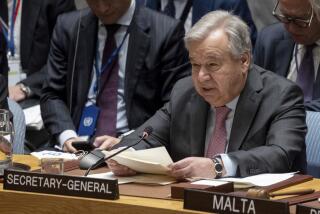A human rights gap
- Share via
The Obama administration says it is committed to protecting human rights and supporting multilateral institutions, and the decision to seek a place on the United Nations Human Rights Council was a step in that direction. We are pleased that the General Assembly voted overwhelmingly last week to seat the United States on the council for the first time since its creation in 2006.
The council was set up to replace the U.N. Human Rights Commission, which was ineffective. Critics are correct that this too is a flawed organization. Many countries on the 47-seat council are cited by international organizations as human rights violators, including other new members Cuba, Saudi Arabia and China. Some governments have used their membership to deflect criticism from their own abuses. And the council has focused disproportionately on Israel’s treatment of Palestinians at the expense of other pressing issues in countries such as Zimbabwe, Sudan and Myanmar. Opponents see these as reasons to shun a discredited council, but we believe they are reasons to engage.
An intergovernmental agency is by definition political and often problematic. In this case, that means joining forces with countries that may not stand up to international scrutiny on human rights -- the same countries the United States works with at the United Nations and in many other international forums. Nothing is to be gained by remaining on the sidelines; the U.S. cannot exercise leadership in a group to which it does not belong. By joining the council, the U.S. has an opportunity to help reform it and build it into a credible advocate for human rights. In 2011, the council must undertake a universal periodic review of its procedures and the human rights records of all 192 U.N. member states. The U.S. can help ensure that both are done professionally and honestly.
We hope that joining the council will help mend the Bush administration’s confrontational relationship with the United Nations and overcome its legacy of abuses committed in the name of the “war on terror.” But here’s where things get complicated: Obama administration decisions last week to withhold photographs of detainees being abused and to continue Bush-era military commissions for prosecuting terrorism suspects cast doubt on the president’s commitment to cleaning house. So too does a threat to halt intelligence-sharing with Britain if a British court makes public details of interrogation techniques used against a former Guantanamo Bay prisoner.
In addition to reforming the Human Rights Council, we would like to see the Obama administration articulate a human rights agenda to pursue on the council, be it for rule of law or women’s rights, or against torture. Of course, it’s not enough to support an agenda; the United States must also follow one.
More to Read
Sign up for Essential California
The most important California stories and recommendations in your inbox every morning.
You may occasionally receive promotional content from the Los Angeles Times.










